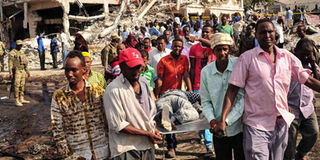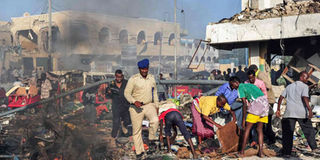
A man reacts on the site where a car bomb exploded at the center of Mogadishu, on October 14, 2017.
|Africa
Premium
Somalia remembers its ‘9/11’ amid renewed terror attacks
For many Somalis, October 14, 2017 was the country’s own ‘September 11’, a day remembered for the horrid terrorist attacks in the US in 2001. In Somalia, though, October 14 was the deadliest truck bombing in the world.
And as tributes poured in on Thursday to commemorate the day, survivors said it reminded them of just how essential security is for the development of the country.
Abdirashid Muse, a political strategist in Mogadishu, says he was travelling from work with colleagues when they suddenly encountered an unusual traffic snarl. After police cleared them, they took another turn of the road, only to hear a loud bang on the other side.

Somali men carry the body of a victim who died in a truck bomb explosion in the centrer of Mogadishu on October 14, 2017.
“Traffic controllers were trying to ease the traffic jam and fortunately, we were able to drive towards KM4 road. When we reached the arch of KM4, something unimaginable happened,” he told the Nation, referring to road sections in Hodan, Mogadishu.
“It was like an earthquake. I was very calm, not terrified,” he added, but admitted everyone had chills down their spines.
In the aftermath of the explosion, people lay down on the streets, visibly traumatised by yet another attack.

Abdirashid Muse, a survivor of the October 14, 2017 bomb attack in Mogadishu.
“I tried my best to help but in my experience, I had to vacate the area,” he added. Al-Shabaab’s modus operandi is that they could quickly follow up with a second explosion ostensibly to target those arriving to help or to gawk at the scene. On this occasion, security forces were able to intercept a second truck laden with similar explosives. But the damage had already been done.
Muse had survived other previous attacks in Mogadishu, often by sheer luck, he says. But he is not going to say he has nine lives.
“I thank the Almighty Allah. Alhamdulilla (all praise be to God). One thing I have learnt is the resilience, power and indomitable will of our Somali people.”
If there was anything to point to Somalia’s fragility, the bomb attack may have just been one of the many raids terrorists have conducted. Subsequent attacks, though, have been either sieges, targeted explosions at public venues or suicide roadside bombs. All deadly, nonetheless.
Here is how it began on October 14, 2017, just about eight months after President Mohamed Farmaajo took office with the promise to annihilate Al-Shabaab in two years.

Men rescue victims on the site of the explosion of a truck bomb in the centre of Mogadishu, on October 14, 2017.
A truck laden with more than 300 kilos of home-made explosives was driven through a traffic checkpoint in Mogadishu’s southeastern district of Hodan. At least 587 people were killed, including those trapped by the falling debris from Safari Hotel, one of the new establishments that marked Mogadishu’s rise from years of ash. Medical teams have since said 626 bodies were counted, most from the scene while others succumbed in hospitals.
Another 400 suffered varying injuries. The exploding truck was worsened by a nearby fuel tanker that caught fire and made it harder for rescuers. No terrorist group formally acknowledged the attack, although security observers have generally believed a faction of Al-Shabaab was behind it to make a statement.
“It is a day that every Somali remembers the sadness,” said President Farmaajo in a commemorative statement.
“Innocent lives of citizens who deserved a full life were cut short by the terrorists. While this incident left an indelible mark on us and showed just how Somalis can come together in times of misfortune.”
In Somalia itself, that attack wasn’t the first nor the last. But it is the worst, to date, from a truck bombing. The biggest similar incident had been a 2011 bombing that killed 100 people. But that was during the Transitional Federal Government era, a worse-off administration in terms of resources and support, compared with today’s federal government.
Yet the Al-Shabaab trouble persists. On September 25, a car bomb exploded at a checkpoint near Somalia's presidential palace, Villa Somalia, signalling just how daring the group can become. Eight people were killed in an attack Al-Shabaab acknowledged as a “martyrdom operation”.
On Tuesday, 12 security officers were killed in the Deynile district of Mogadishu when another car bomb exploded and hit their patrol vehicle. On the same day, a suicide bomber exploded in a tea shop in Mogadishu, killing five people and injuring half a dozen others.
Abdirahman Abdishakur, leader of the Wadajir political party, says the attack was a failed attempt by terrorists to kill the spirit of the country through death and destruction.
“We pray for those who died in the massacre & we share the grief with the victims' children, parents & families,” he wrote on his Twitter page.
“The aim of terrorists is to kill our spirit, to live in fear, leave us hopeless & force on us their corrupt ideology & sadistic rule. That will never happen.”





